EUR/USD
Temporary unwinding from oversold conditions.
Lowered stop to breakeven, thereby ensuring a risk-free trade. EUR/USD is temporarily unwinding from oversold conditions. However, it is still likely to see the bearish impulsive move is extend from key overhead resistance (primarily a 2 year trend and its long-term 200-day average). Bearish sentiment also remains anchored by heightened contagion fears driven from the greater European sovereign debt risk.
A sustained close beneath 1.3146 (Oct swing low) will re-establish the larger downtrend from April and target 1.3000 (psychological level), then 1.2870 (2011 major low).
Keep an eye on highly correlated risk-related proxies, such as the S&P500 and AUD/USD, which both continue to exhibit downside presssures.
Inversely, the USD Index is extending its recovery higher and is fast approaching the recent 9-month highs near 80, (a move worth almost 10%). Speculative (net long) liquidity flows have unwound from recent spike highs (3 standard deviations from the yearly average). This will likely remain strong and help resume the USD’s major bull-run from its historic oversold extremes (momentum, sentiment and liquidity).
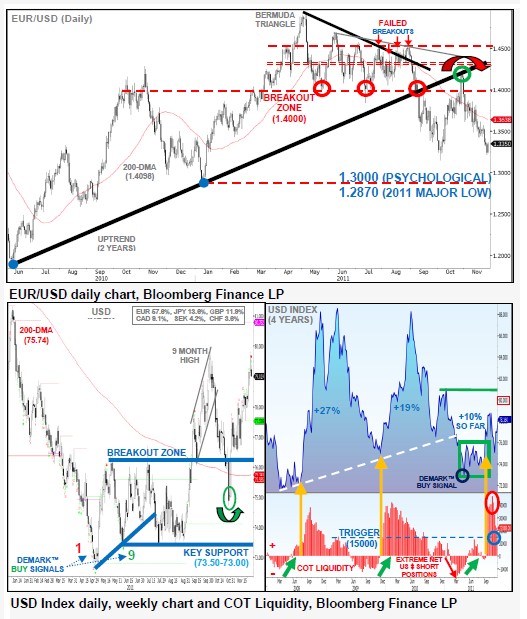
GBP/USD
Contained within an hourly channel for now.
GBP/USD continues to edge lower remaining within the confines of a falling channel. A break back over 1.5566 will warn of a larger recovery phase. In the meantime, scope is seen for a continuation of weakness. It is preferred to wait for a break lower, under the support of the falling channel, before we attempt to capitalise on a possible recovery. Should any such weakness fail to gain momentum, we will then look to buy into a recovery.
This scenario is also supported by the generally rangebound nature of the market in the medium-term timeframe, favouring a return to 1.6167.
A sustained break under 1.5272 is required to turn the medium-term bias decidedly bearish.
We await the formation of short-term structure to assist us in our formulation of strategy.
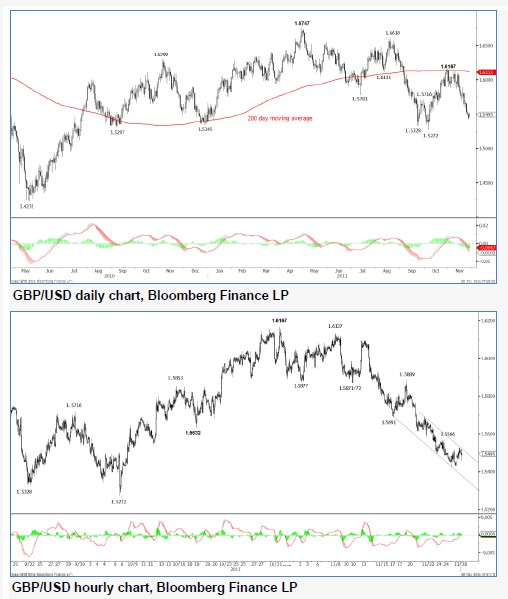
USD/JPY
Minor rebound, but downside risks remain.
USD/JPY is experiencing a minor rebound. However, downside risks remain, with the growing probability of another price retracement back to pre-intervention levels (PIR) and potentially even a new post world war record low beneath 75.35 (PINL).
Furthermore, sentiment in the option markets continues to suggest that USD/JPY buying pressure remains overcrowded as everyone in the market continues to try and be the first to call the market bottom.
This may inspire a temporary, but dramatic, price spike through psychological levels at 75.00 and perhaps even sub-74.00. Such a move would help flush out a number of downside barriers and stop-loss orders, which would create healthy price vacuum for a potential major reversal.
The medium/long-term view remains bullish, as USD/JPY verges toward a major long-term 40 year cycle upside reversal. Expect key cycle inflection points to trigger into November-December this year, offering a sustained move above our upside trigger level at 80.00/60, then 82.00 and 83.30.
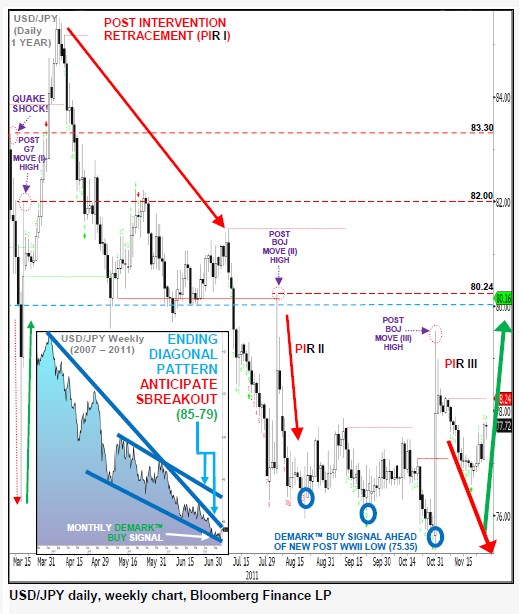
USD/CHF
Break over 0.9316 strengthens medium-term outlook.
USD/CHF saw a break back over 0.9316 last week. This structural break over the October high strengthens the medium term structure. However, scope is seen for a corrective phase lower, with resistance anticipated close to 0.9600, should further strength follow. As mentioned last week, demand for Swiss Francs is likely to continue while yields on Spanish and Italian government bonds remain elevated, currently trading at 6.667% and 7.111% respectively.
On the left we show the German sovereign yield curve (solid line), compared with the same yield curve one week ago. This shows a deterioration in the way in which the core Euro-Zone bond market is perceived by the market as a whole. If yields in Germany continue to rise this will likely mark an acceleration of deterioration in the Euro Zone.
A break under hourly channel support, currently at 0.9205 not weakens the near-term outlook. Under 0.9085 will warn of a larger corrective phase lower.
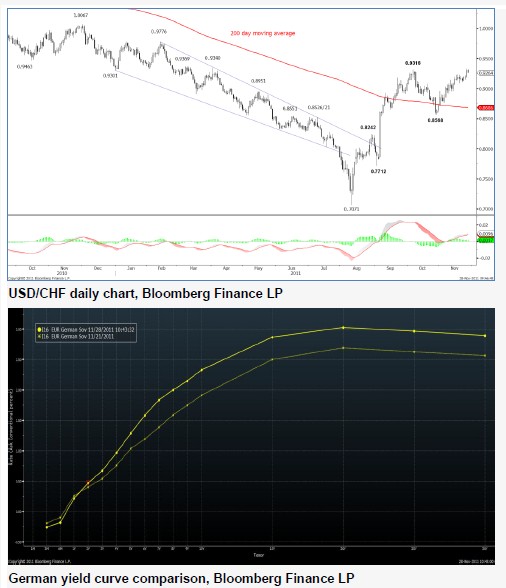
USD/CAD
Sharp Setbacks.
Exited at 1.0350, having achieved 2 price objectives on long position. USD/CAD has triggered a sharp setback, following last week’s strong bull charge.
A directional confirmation above 1.0658 is still needed to unlock the recovery into 1.0850 plus. This would extend the upside breakout from the rate’s ending triangle pattern, which was part of a major Elliott Wave cycle.
Only a sustained close beneath 1.0230 and parity unlocks bearish setbacks into the long-term 200-day MA at 0.9844 and 0.9726 (31st Aug low).
EUR/CAD is still holding above its 200-day MA, within a large multi-month trading range. key resistance continues to hold at 1.4379 (June swing high), which has for some time marked a strong distribution pattern.
CHF/CAD is now retesting its 200-day MA at 1.1363, while maintaining a multi-week trading range. This follows the dramatic price slide lower (which was triggered by the SNB intervention). The cross-rate has now retraced more than half of its 2011 gains.
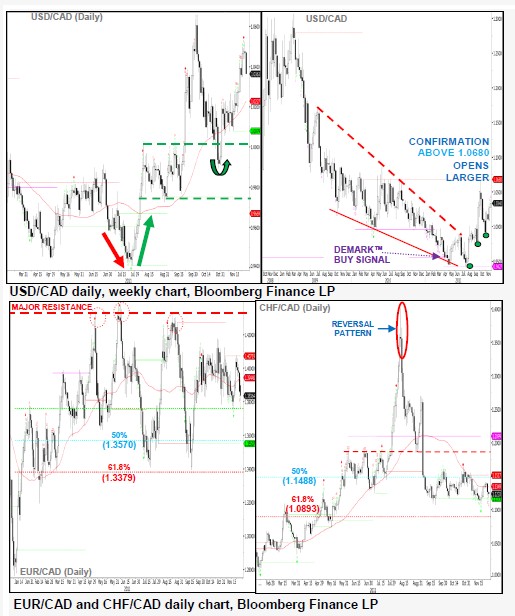
AUD/USD
Unwinding from oversold conditions.
AUD/USD is still attempting to unwind from oversold conditions, following its accelerated decline through the 1.0000 psychological level.
The move must be sustained below 1.0000 to further compound downside pressure on the rate’s multi-year uptrend and push back towards 0.9611.
Elsewhere, the Aussie dollar remains strong against the New Zealand dollar. However, near-term price activity is mean reverting back into the 200- day MA. Expect a sharp setback to ensue over the multi-day horizon.
The Aussie dollar has reversed gains against the Japanese yen and is now trading back below the long-term 200-day MA which is currently at 82.67. Watch for further downside scope into support at 72.00 which would signal further unwinding of risk appetite
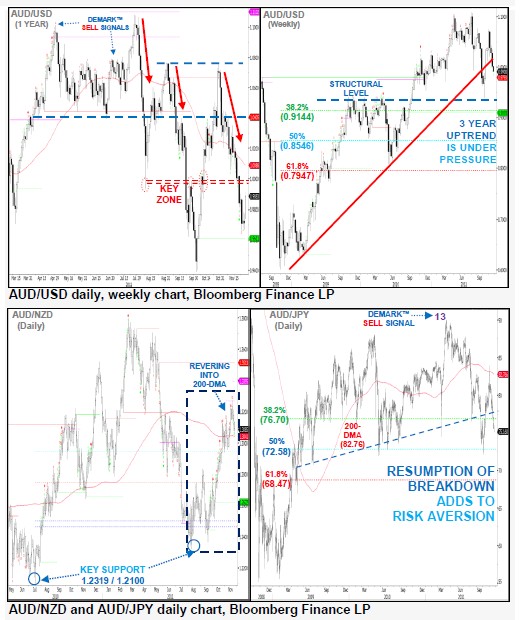
GBP/JPY
Break out of hourly bear channel, suggests a corrective phase.
GBP/JPY may be entering a corrective phase higher following the break out of hourly bear channel resistance. With this in mind, a higher low is anticipated ahead of 119.38, should a short-term pullback take place. This is also supported by the minor recovery seen in equities globally and in particular in the S&P500.
However, while under the hourly high at 121.77 the near-term negative structure is maintained.
Although a recovery phase is now favoured, further signs of continued strength are sought ahead of strategy formulation.
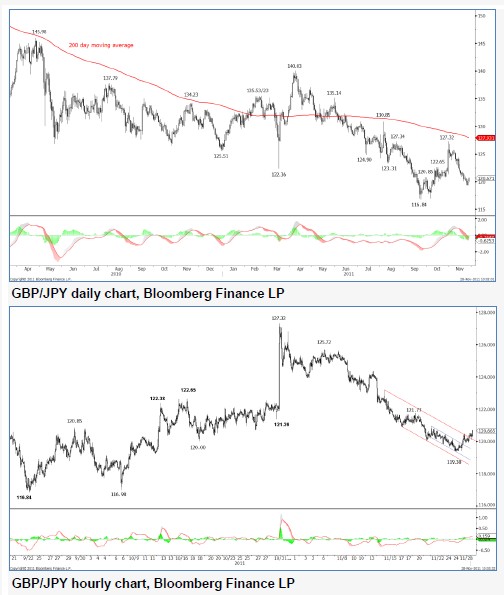
EUR/JPY
Enters into a near-term corrective phase.
EUR/JPY continues to grind lower after failing to hold the extension higher that occurred at the end of October. In fact the fall that has taken place since 111.60 has the appearance of a corrective phase, suggesting scope for a further leg higher. The break out of the hourly falling channel that has taken place during the most recent session is now suggestive of a larger corrective phase higher.
However, the EUR component of this pair is highly affected by the movement in EUR/USD. As the yields in Spanish and Italian government bonds continue to rise, this puts more downside pressure on the EUR. A break under 1.3146 in the EUR/USD will end the rising phase seen since 2010. This would likely be associated with a fall back down to 100.76 and potentially lower.
A sustained hold over the 200 day moving average will turn the mediumterm outlook more bullish
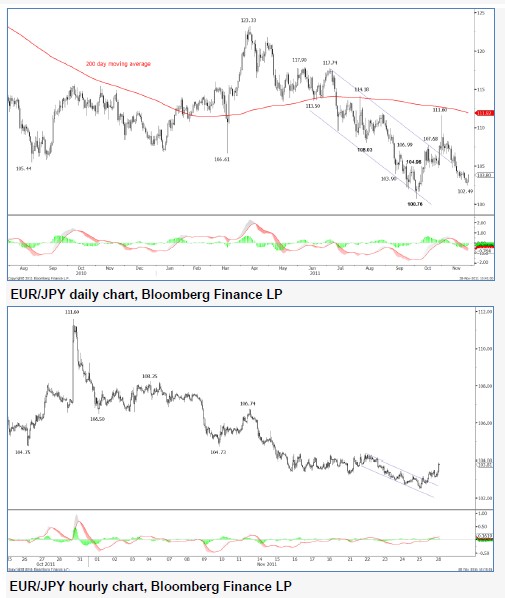
EUR/GBP
Bias remains bearish.
EUR/GBP continues to frustrate, failing to garner any momentum following the recent break of the key 0.8530/31 lows. Given the precarious situation in the Euro-Zone, our mild bearish bias remains, favouring an eventual return to weakness if German sovereign debt continues to be sold off. It is anticipated that if the deterioration in the Euro-Zone continues then Sterling could be viewed as a safe haven. Thus focus remains on the Italian and Spanish government bond markets too.
An eventual fall back under 0.8486 is anticipated. With this in mind, the formulation of a short strategy is still favoured, although a deeper pullback of the 0.8831-0.8486 fall is required ahead of entry.
Our bias remains mildly bearish with trade continuing under both the 200 day and 50 week moving averages. We keep an eye on the 1.3146 level in EUR/USD. A push under this level will mark a clear breakdown of confidence in the EUR.
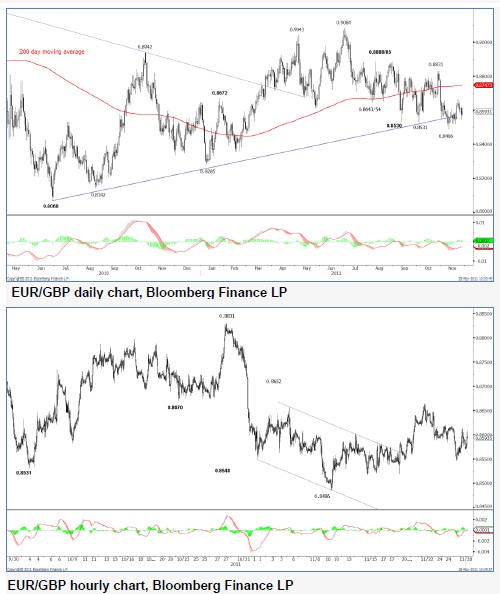
EUR/CHF
Range bound between 1.2131 and 1.2474. Breakout sought.
EUR/CHF is maintaining its tight trading range just under the 1.2500 level. It is anticipated that this zone may see a degree of resistance, particularly in light of the movement in periphery yield spreads versus bunds. Over time, this may lead to a renewed desire for a safe haven, with downside pressure returning to EUR/CHF.
We would prefer to trade this from a momentum perspective, awaiting a return to the 1.2000 region. Should a re-test of the 1.2000 region take place with a fall under 1.1973 also following, this would warn of the end of the recovery seen since 1.0075, increasing the probability of a return to this level.
Short-term structure continues to be suggestive of a further rise back towards the 1.2500 zone, where further resistance would be expected. It remains to be seen if the SNB will be able to hold back the possible flow of funds into Swiss Francs, that may occur, if further stresses lead to yet higher yields in Italian/Spanish/French government bonds.
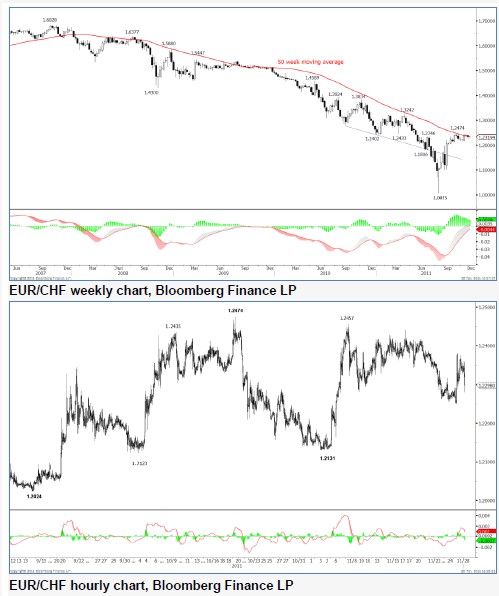
Temporary unwinding from oversold conditions.
Lowered stop to breakeven, thereby ensuring a risk-free trade. EUR/USD is temporarily unwinding from oversold conditions. However, it is still likely to see the bearish impulsive move is extend from key overhead resistance (primarily a 2 year trend and its long-term 200-day average). Bearish sentiment also remains anchored by heightened contagion fears driven from the greater European sovereign debt risk.
A sustained close beneath 1.3146 (Oct swing low) will re-establish the larger downtrend from April and target 1.3000 (psychological level), then 1.2870 (2011 major low).
Keep an eye on highly correlated risk-related proxies, such as the S&P500 and AUD/USD, which both continue to exhibit downside presssures.
Inversely, the USD Index is extending its recovery higher and is fast approaching the recent 9-month highs near 80, (a move worth almost 10%). Speculative (net long) liquidity flows have unwound from recent spike highs (3 standard deviations from the yearly average). This will likely remain strong and help resume the USD’s major bull-run from its historic oversold extremes (momentum, sentiment and liquidity).

GBP/USD
Contained within an hourly channel for now.
GBP/USD continues to edge lower remaining within the confines of a falling channel. A break back over 1.5566 will warn of a larger recovery phase. In the meantime, scope is seen for a continuation of weakness. It is preferred to wait for a break lower, under the support of the falling channel, before we attempt to capitalise on a possible recovery. Should any such weakness fail to gain momentum, we will then look to buy into a recovery.
This scenario is also supported by the generally rangebound nature of the market in the medium-term timeframe, favouring a return to 1.6167.
A sustained break under 1.5272 is required to turn the medium-term bias decidedly bearish.
We await the formation of short-term structure to assist us in our formulation of strategy.

USD/JPY
Minor rebound, but downside risks remain.
USD/JPY is experiencing a minor rebound. However, downside risks remain, with the growing probability of another price retracement back to pre-intervention levels (PIR) and potentially even a new post world war record low beneath 75.35 (PINL).
Furthermore, sentiment in the option markets continues to suggest that USD/JPY buying pressure remains overcrowded as everyone in the market continues to try and be the first to call the market bottom.
This may inspire a temporary, but dramatic, price spike through psychological levels at 75.00 and perhaps even sub-74.00. Such a move would help flush out a number of downside barriers and stop-loss orders, which would create healthy price vacuum for a potential major reversal.
The medium/long-term view remains bullish, as USD/JPY verges toward a major long-term 40 year cycle upside reversal. Expect key cycle inflection points to trigger into November-December this year, offering a sustained move above our upside trigger level at 80.00/60, then 82.00 and 83.30.

USD/CHF
Break over 0.9316 strengthens medium-term outlook.
USD/CHF saw a break back over 0.9316 last week. This structural break over the October high strengthens the medium term structure. However, scope is seen for a corrective phase lower, with resistance anticipated close to 0.9600, should further strength follow. As mentioned last week, demand for Swiss Francs is likely to continue while yields on Spanish and Italian government bonds remain elevated, currently trading at 6.667% and 7.111% respectively.
On the left we show the German sovereign yield curve (solid line), compared with the same yield curve one week ago. This shows a deterioration in the way in which the core Euro-Zone bond market is perceived by the market as a whole. If yields in Germany continue to rise this will likely mark an acceleration of deterioration in the Euro Zone.
A break under hourly channel support, currently at 0.9205 not weakens the near-term outlook. Under 0.9085 will warn of a larger corrective phase lower.

USD/CAD
Sharp Setbacks.
Exited at 1.0350, having achieved 2 price objectives on long position. USD/CAD has triggered a sharp setback, following last week’s strong bull charge.
A directional confirmation above 1.0658 is still needed to unlock the recovery into 1.0850 plus. This would extend the upside breakout from the rate’s ending triangle pattern, which was part of a major Elliott Wave cycle.
Only a sustained close beneath 1.0230 and parity unlocks bearish setbacks into the long-term 200-day MA at 0.9844 and 0.9726 (31st Aug low).
EUR/CAD is still holding above its 200-day MA, within a large multi-month trading range. key resistance continues to hold at 1.4379 (June swing high), which has for some time marked a strong distribution pattern.
CHF/CAD is now retesting its 200-day MA at 1.1363, while maintaining a multi-week trading range. This follows the dramatic price slide lower (which was triggered by the SNB intervention). The cross-rate has now retraced more than half of its 2011 gains.

AUD/USD
Unwinding from oversold conditions.
AUD/USD is still attempting to unwind from oversold conditions, following its accelerated decline through the 1.0000 psychological level.
The move must be sustained below 1.0000 to further compound downside pressure on the rate’s multi-year uptrend and push back towards 0.9611.
Elsewhere, the Aussie dollar remains strong against the New Zealand dollar. However, near-term price activity is mean reverting back into the 200- day MA. Expect a sharp setback to ensue over the multi-day horizon.
The Aussie dollar has reversed gains against the Japanese yen and is now trading back below the long-term 200-day MA which is currently at 82.67. Watch for further downside scope into support at 72.00 which would signal further unwinding of risk appetite

GBP/JPY
Break out of hourly bear channel, suggests a corrective phase.
GBP/JPY may be entering a corrective phase higher following the break out of hourly bear channel resistance. With this in mind, a higher low is anticipated ahead of 119.38, should a short-term pullback take place. This is also supported by the minor recovery seen in equities globally and in particular in the S&P500.
However, while under the hourly high at 121.77 the near-term negative structure is maintained.
Although a recovery phase is now favoured, further signs of continued strength are sought ahead of strategy formulation.

EUR/JPY
Enters into a near-term corrective phase.
EUR/JPY continues to grind lower after failing to hold the extension higher that occurred at the end of October. In fact the fall that has taken place since 111.60 has the appearance of a corrective phase, suggesting scope for a further leg higher. The break out of the hourly falling channel that has taken place during the most recent session is now suggestive of a larger corrective phase higher.
However, the EUR component of this pair is highly affected by the movement in EUR/USD. As the yields in Spanish and Italian government bonds continue to rise, this puts more downside pressure on the EUR. A break under 1.3146 in the EUR/USD will end the rising phase seen since 2010. This would likely be associated with a fall back down to 100.76 and potentially lower.
A sustained hold over the 200 day moving average will turn the mediumterm outlook more bullish

EUR/GBP
Bias remains bearish.
EUR/GBP continues to frustrate, failing to garner any momentum following the recent break of the key 0.8530/31 lows. Given the precarious situation in the Euro-Zone, our mild bearish bias remains, favouring an eventual return to weakness if German sovereign debt continues to be sold off. It is anticipated that if the deterioration in the Euro-Zone continues then Sterling could be viewed as a safe haven. Thus focus remains on the Italian and Spanish government bond markets too.
An eventual fall back under 0.8486 is anticipated. With this in mind, the formulation of a short strategy is still favoured, although a deeper pullback of the 0.8831-0.8486 fall is required ahead of entry.
Our bias remains mildly bearish with trade continuing under both the 200 day and 50 week moving averages. We keep an eye on the 1.3146 level in EUR/USD. A push under this level will mark a clear breakdown of confidence in the EUR.

EUR/CHF
Range bound between 1.2131 and 1.2474. Breakout sought.
EUR/CHF is maintaining its tight trading range just under the 1.2500 level. It is anticipated that this zone may see a degree of resistance, particularly in light of the movement in periphery yield spreads versus bunds. Over time, this may lead to a renewed desire for a safe haven, with downside pressure returning to EUR/CHF.
We would prefer to trade this from a momentum perspective, awaiting a return to the 1.2000 region. Should a re-test of the 1.2000 region take place with a fall under 1.1973 also following, this would warn of the end of the recovery seen since 1.0075, increasing the probability of a return to this level.
Short-term structure continues to be suggestive of a further rise back towards the 1.2500 zone, where further resistance would be expected. It remains to be seen if the SNB will be able to hold back the possible flow of funds into Swiss Francs, that may occur, if further stresses lead to yet higher yields in Italian/Spanish/French government bonds.

